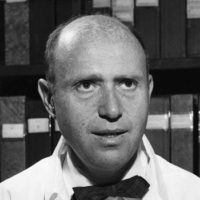
Theodore Puck
University of California
For development of original methods for pure culture of living mammalian cells as a basis for new research in their nutrition, growth, genetics, and mutation.
Biologists have long sought a means for studying the descendents of single mammalian cells. The highly original and imaginative investigations of Theodore Puck have now made possible the cultivation of single mammalian cells.
Through his ingenious culture techniques, these cells can now be grown in "pure" colonies—from nearly any organ including normal and cancerous, adult and newborn tissue.
Since each cell in the colony is an "identical twin" of the single parent cell, this permits consistent, quantitative studies on individual mammalian cells for the first time. In these cells, heritable differences are found to remain stable through innumerable successive generations.
This advance promises to be as significant as the development of methods for growing bacteria in pure culture. A new research tool has been created for cellular research on the effects of carcinogens and other chemical agents, on the effects of foods and vitamins, the processes of growth and aging, and on the effects of the physical environment.
Dr. Puck has found with his pioneering single-cell techniques the first direct evidence that mammalian cells can carry a latent virus. He has also found that high-strength radiation greatly increases the frequency of mutation and that the genetic apparatus may suffer radiobiologic damage from a dose as low as 96 roentgens.
Trained initially as a physical chemist, Dr. Puck has brought to his extensive studies of biological phenomena a point of view untrammeled by orthodoxy, a rigor in scientific method and incisiveness in reasoning which have placed him in the forefront of students of the mammalian cell.
